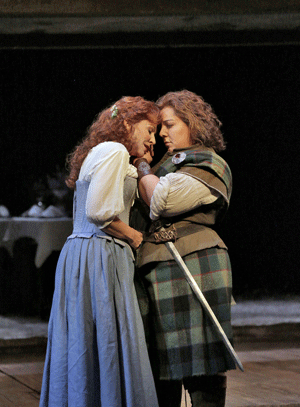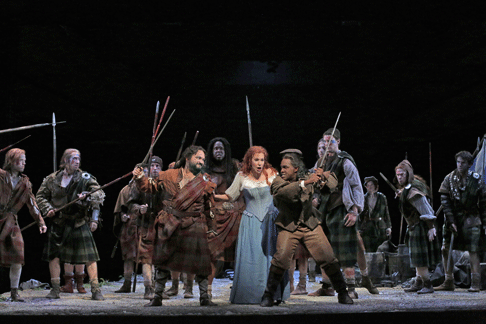![Joyce DiDonato as Elena [Photo © 2013 Ken Howard]](http://www.operatoday.com/DDL_3227.gif)
13 Aug 2013
La Donna del Lago at Santa Fe
Based on Sir Walter Scott’s narrative poem “The Lady of the Lake,” the opera by Rossini and librettist Andrea Leone Tottola was first seen in 1819 at the Teatro San Carlo in Naples.
English Touring Opera are delighted to announce a season of lyric monodramas to tour nationally from October to December. The season features music for solo singer and piano by Argento, Britten, Tippett and Shostakovich with a bold and inventive approach to making opera during social distancing.
This tenth of ten Live from London concerts was in fact a recorded live performance from California. It was no less enjoyable for that, and it was also uplifting to learn that this wasn’t in fact the ‘last’ LfL event that we will be able to enjoy, courtesy of VOCES8 and their fellow vocal ensembles (more below …).
Ever since Wigmore Hall announced their superb series of autumn concerts, all streamed live and available free of charge, I’d been looking forward to this song recital by Ian Bostridge and Imogen Cooper.
The Sixteen continues its exploration of Henry Purcell’s Welcome Songs for Charles II. As with Robert King’s pioneering Purcell series begun over thirty years ago for Hyperion, Harry Christophers is recording two Welcome Songs per disc.
Although Stile Antico’s programme article for their Live from London recital introduced their selection from the many treasures of the English Renaissance in the context of the theological debates and upheavals of the Tudor and Elizabethan years, their performance was more evocative of private chamber music than of public liturgy.
In February this year, Albanian soprano Ermonela Jaho made a highly lauded debut recital at Wigmore Hall - a concert which both celebrated Opera Rara’s 50th anniversary and honoured the career of the Italian soprano Rosina Storchio (1872-1945), the star of verismo who created the title roles in Leoncavallo’s La bohème and Zazà, Mascagni’s Lodoletta and Puccini’s Madama Butterfly.
Evidently, face masks don’t stifle appreciative “Bravo!”s. And, reducing audience numbers doesn’t lower the volume of such acclamations. For, the audience at Wigmore Hall gave soprano Elizabeth Llewellyn and pianist Simon Lepper a greatly deserved warm reception and hearty response following this lunchtime recital of late-Romantic song.
Collapsology. Or, perhaps we should use the French word ‘Collapsologie’ because this is a transdisciplinary idea pretty much advocated by a series of French theorists - and apparently, mostly French theorists. It in essence focuses on the imminent collapse of modern society and all its layers - a series of escalating crises on a global scale: environmental, economic, geopolitical, governmental; the list is extensive.
For this week’s Live from London vocal recital we moved from the home of VOCES8, St Anne and St Agnes in the City of London, to Kings Place, where The Sixteen - who have been associate artists at the venue for some time - presented a programme of music and words bound together by the theme of ‘reflection’.
'Such is your divine Disposation that both you excellently understand, and royally entertaine the Exercise of Musicke.’
Amongst an avalanche of new Mahler recordings appearing at the moment (Das Lied von der Erde seems to be the most favoured, with three) this 1991 Mahler Second from the 2nd Kassel MahlerFest is one of the more interesting releases.
‘And there was war in heaven: Michael and his angels fought against the dragon; and the dragon fought and his angels, And prevailed not; neither was their place found any more in heaven … that old serpent … Satan, which deceiveth the whole world: he was cast out into the earth, and his angels were cast out with him.’
If there is one myth, it seems believed by some people today, that probably needs shattering it is that post-war recordings or performances of Wagner operas were always of exceptional quality. This 1949 Hamburg Tristan und Isolde is one of those recordings - though quite who is to blame for its many problems takes quite some unearthing.
There was never any doubt that the fifth of the twelve Met Stars Live in Concert broadcasts was going to be a palpably intense and vivid event, as well as a musically stunning and theatrically enervating experience.
‘Love’ was the theme for this Live from London performance by Apollo5. Given the complexity and diversity of that human emotion, and Apollo5’s reputation for versatility and diverse repertoire, ranging from Renaissance choral music to jazz, from contemporary classical works to popular song, it was no surprise that their programme spanned 500 years and several musical styles.
The Academy of St Martin in the Fields have titled their autumn series of eight concerts - which are taking place at 5pm and 7.30pm on two Saturdays each month at their home venue in Trafalgar Square, and being filmed for streaming the following Thursday - ‘re:connect’.
The London Symphony Orchestra opened their Autumn 2020 season with a homage to Oliver Knussen, who died at the age of 66 in July 2018. The programme traced a national musical lineage through the twentieth century, from Britten to Knussen, on to Mark-Anthony Turnage, and entwining the LSO and Rattle too.
With the Live from London digital vocal festival entering the second half of the series, the festival’s host, VOCES8, returned to their home at St Annes and St Agnes in the City of London to present a sequence of ‘Choral Dances’ - vocal music inspired by dance, embracing diverse genres from the Renaissance madrigal to swing jazz.
Just a few unison string wriggles from the opening of Mozart’s overture to Le nozze di Figaro are enough to make any opera-lover perch on the edge of their seat, in excited anticipation of the drama in music to come, so there could be no other curtain-raiser for this Gala Concert at the Royal Opera House, the latest instalment from ‘their House’ to ‘our houses’.
"Before the ending of the day, creator of all things, we pray that, with your accustomed mercy, you may watch over us."
![Joyce DiDonato as Elena [Photo © 2013 Ken Howard]](http://www.operatoday.com/DDL_3227.gif)
Based on Sir Walter Scott’s narrative poem “The Lady of the Lake,” the opera by Rossini and librettist Andrea Leone Tottola was first seen in 1819 at the Teatro San Carlo in Naples.
 Joyce DiDonato as Elena and Marianna Pizzolato as Malcolm
Joyce DiDonato as Elena and Marianna Pizzolato as Malcolm
It tells of James V of Scotland (1512 - 1542), the father of Mary Queen of Scots, and his relationship with the family of his estranged tutor, Duglas of Angus. The Lady of the Lake was Duglas’s daughter, Elena, who often enjoyed boating on Loch Katrine.
Not many United States operagoers have seen Gioachino Rossini’s 1819 opera, La Donna del Lago. Thus, when performances were announced at Santa Fe Opera, all six were sold out before opening night. As a result, the company added a performance at the end of the season. Based on Sir Walter Scott’s narrative poem The Lady of the Lake, the opera by Rossini and librettist Andrea Leone Tottola was first seen in 1819 at the Teatro San Carlo in Naples. It tells of James V of Scotland (1512 - 1542), the father of Mary Queen of Scots, and his relationship with the family of his estranged tutor, Duglas of Angus. The Lady of the Lake was Duglas’s daughter, Elena, who often enjoyed boating on Loch Katrine.
Director Paul Curran described the work as a medieval story based in Arthurian legend but seen through nineteenth century eyes. He told the story in realistic terms without any updating. Kevin Knight’s scenery was plain, but evocative of the ambience of the heather-strewn Scottish countryside. His costumes set the action in the unrest of the sixteenth century. Lighting is always of optimum importance in this open-sided theater and Duane Schuler’s designs added much to the visual quality of the piece.
Santa Fe Opera’s production featured an all-star cast in which coloratura mezzo-sopranos Joyce DiDonato and Marianna Pizzolato sang with agile-voiced tenors Lawrence Brownlee and René Barbera. DiDonato was a tall, elegant Elena, who rendered the most difficult coloratura with exquisite taste and beauty of tone. Brownlee was brilliant as Uberto, the disguised King James V. The flexibility of his voice is truly amazing, but even though he was a ruler, he did not get the girl! Neither did Barbera as Rodrigo di Dhu, whom Duglas had chosen to be Elena's husband. While Brownlee’s voice is smooth and his tones burnished, Barbera’s is light and bright. The suitor who finally wins Elena is Malcolm, a pants-role character. Pizzolato sang the part with smooth tones and wonderful vocal flexibility.
 Rene Barbera as Rodrigo, Joyce DiDonato as Elena, and Lawrence Brownlee as Uberto
Rene Barbera as Rodrigo, Joyce DiDonato as Elena, and Lawrence Brownlee as Uberto
Duglas, portrayed by Wayne Tigges, was the main villain in the piece. He sang with dark menacing tones and commanded the stage while keeping his daughter apart from her true love. Three apprentices acquitted themselves well in this performance. Lucy Sauter was a sweet-sounding Albina, while Joshua Dennis and David Blalock were effective in their roles as servants. Every year Susanne Sheston makes a first class opera chorus out of the diverse group of apprentices who come to Santa Fe for the summer. This year she has succeeded beyond all expectations. Although the work was new to them, the Santa Fe Opera Orchestra conducted by Stephen Lord played Rossini’s difficult score in exquisite bel canto style. There were many solos, particularly for wind instruments and all of them were perfectly rendered. With Rossini’s fabulous music and this wonderful cast, perhaps we will be able to become more familiar with this beautiful opera and hear it in other settings.
by Maria Nockin
Cast and production Information:
Elena, Joyce DiDonato; Uberto (James V in disguise), Lawrence Brownlee; Albina, Lucy Sauter; Serano, Joshua Dennis; Malcolm, Marianna Pizzolato; Duglas, Wayne Tigges; Rodrigo, René Barbera; Bertram, David Blalock; Director, Paul Curran; Design, Kevin Knight; Lighting, Duane Schuler; Chorus Master, Susanne Sheston; Conductor, Stephen Lord.